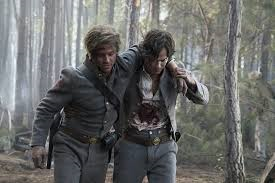It’s easy to see why the “time-loop” premise is so appealing to sci-fi shows. On a purely practical level, you can reuse the same set and cast of extras and supporting players for an entire running time. Beyond the practical rationales, however, is the way in which it allows a series to focus on characters by trapping them in the same situation over and over again. The plot stays the same (until the final time that it doesn’t and everything it rectified), but how the characters react to it can reveal what makes them so compelling. The narrative device can allow for the opportunity to examine how the characters view themselves and how others see them. In honor of February 2 (the date for perhaps the greatest time loop film of all time), I present you with nine brilliant episodes that explore time loop narratives:
1. Charmed, “Deja Vu All Over Again”
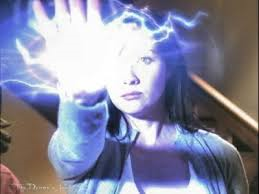
No one will ever call Charmed, Aaron Spelling’s attempt to merge Charlie’s Angels with Buffy, the Vampire Slayer, a great series. However, to write it off completely is hardly fair either. It had some fun with it’s girl power/ witch power metaphors and had the most effective Buffy/ Angel rip-off on tv between with Phoebe and demon Cole. Here, in the season 1 finale, the sisters find themselves targeted by a demon who wants them dead. Normally, this wouldn’t be a problem, but this demon is supported by an individual with the ability to turn back time. The demon attempts to kill the Charmed ones, is killed for his troubles, but gets a little closer in killing all three with each attempt. It’s finally resolved through the loss of a series regular, and we see that for all the series’ silliness, there is an emotional core that makes it worthwhile. It will never be Buffy or even Vampire Diaries, actually, but it had a… dare I say…charm all its own.
2. Supernatural, “Mystery Spot”
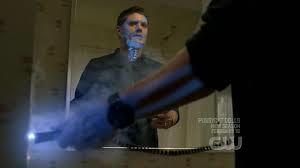
As it was originally conceived, Supernatural was simply about 2 brothers hunting demons and trying to reconnect with one another. As it progressed, both brothers have died so many times even Spinal Tap drummers are looking at them with eyebrows raised. In this Season 3 (and near series’ best) episode, Supernatural explores the possibly unhealthy obsession both Sam and Dean have with risking everything to save one another. What makes this episode so perfect, however, is that it does so by killing Dean in increasingly absurd fashion. Each day, no matter what Sam does, Dean will die, the day will start over (signaled with Asia’s “Heat of the Moment” blaring from a clock radio), and everything will begin again, with only Sam remembering the events that have played out before. Of course, what the episode is trying to point out is that Dean is destined to die (he’d made a deal to resurrect Sam in the last season), and there’s nothing Sam can do about it. Sam and Dean will always stand together, will rip the world apart for the other, but for the first time, the show wonders whether or not this is the most mentally sound course of action. The series has had its share of funny episodes and tragic episodes, but it has probably never melded both together more effectively.
3. Fringe, “White Tulip”
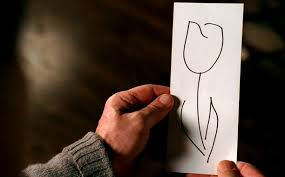
Looking at “White Tulip” several years removed from the last time loopy, parallel world containing, Observer-battling series Fringe graced the airwaves, it’s easy to see that this was the series’ masterpiece. It features one of the series’ most sympathetic antagonists, a man who is breaking time’s laws in order to save his wife, unaware of the cost such an endeavor is having on the rest of the world. Through that main plot we are better able to reexamine series regular Walter Bishop, a man who also broke the laws of the universe in order to save his dying son. Both men undertook rash actions, unaware and unconcerned with the potential consequences. All they care about are saving the ones they love. It’s easy to feel sympathy with such a quest. When the two men meet, they discuss the nature of existence, whether or not they are being punished (by God, or fate, or just the universe attempting to return to the natural order), and whether or not forgiveness is even possible. The final image of a hand-drawn white tulip says everything that could possible be said about such a hope.
4. Angel, “Time Bomb”
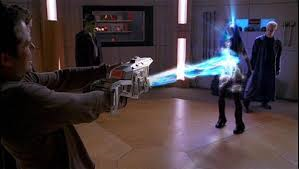
The final season of the Buffy, the Vampire Slayer spinoff about a vampire with a soul looking for redemption is both its strangest and its best. It gave us so many Whedon classics (“Smile Time,” “A Hole in the World,” and “You’re Welcome,” just to name a few). It also gave us the character of Ilyria, an ancient demon who invaded the body of the lovable Fred Berkle, hollowed her out, and used her form to exist in contemporary world. Naturally, this turn of events devastated the entire Angel crew, but for Wesley, the man who loved Fred from afar before the two characters realized they were always meant to be together, it was more than his sanity could handle. He began to see Ilyria as his means to doing for her what he couldn’t do for Fred: save her. In this episode Ilyria’s powers are beginning to escalate out of control, always ending with her going off like an atomic bomb, before event are reset and the same scenario must be played out until a solution can be devised. Of course Wesley, the noble failure who only succeeds with this character who believed she was incapable of emotional connection, figures out how to stop her from destroying the world, but what really makes this episode work is the obvious emotional trauma Wesley feels in regards to Fred’s loss and how little his inner circle of friends can do to help him.
5. Doctor Who, “Heaven Sent”
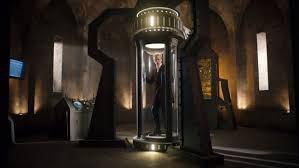
I’ve already written about this episode before, but this episode easily emerges as the biggest risk Doctor Who has ever taken. The Doctor, still grieving the death of his companion, is placed in a world in which he is forced to relive the same amount of time over and over again, wallowing in the grief process. He makes some progress, reaches some conclusions, but then is forced back to the beginning. The episode almost becomes a metaphor for grief, as you think your making progress, only to have that emotional breakthrough become an emotional setback and you find yourself right back where you started. It may not sound like much here, but it’s perhaps the darkest, grimmest use of the time loop on this countdown.
6. X-Files, “Monday”
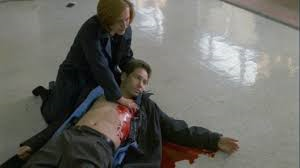
Are we just fate’s pawns, or do we have any free will? That’s the question at the heart of this Vince Gilligan-penned X-Files episode, in which Mulder wakes up, realizes his water bed has sprung a leak, goes to the bank to deposit his paycheck and ends up in the midst of a bank robbery. Someone is shot, en explosion occurs, and the day resets, with only one woman aware of the perpetual loop. What makes this episode so brilliant is the way in which little things shift (Scully goes to the bank for Mulder, Mulder trips over his sneakers in one iteration but not the next, the dialog varies), but no matter what, all of the same players end up in the same positions. In the end, the loop is broken, but it’s a hollow victory and no one ever really determines how much control we really have over our lives.
7. Blood Ties, 5:55
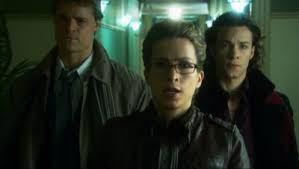
Blood Ties, based on a series of novels by Tanya Huff, centers around Kate, a private eye (who is slowly going blind) and her relationship with vampire Henry Fitzroy, who helps her solve supernatural cases. In this particular episode, Kate is investigating a mysterious box. The box is opened and dark, supernatural forces are unleashed upon the world (think Pandora), and time reverts to the start of the new day. What follows is a clever, fun episode of Blood Ties, which was hardly essential viewing. But if you want to give the series a try, this is probably its high point.
8. Star Trek: The Next Generation: “Cause and Effect”

The Star Trek franchise loved time loops and time travel as much as any sci-fi franchise ever has. Here, we feature a Next Generation episode in which a ship collides with the Enterprise, killing everyone on board, only to have the day reset. Dr. Crusher is the only crew member who initially realizes what is happening, as each iteration becomes an exercise in deja vu. What transpires is an entertaining episode with a very simple solution.
9. Person of Interest: “If, Then, Else”
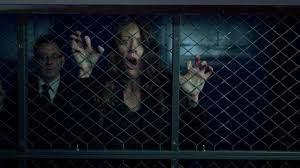
It’s pretty rare for a non-sci-fi series to utilize the time loop plot. It’s pretty obvious why. After all, how do you explain a temporal anomolie when your show exists in a real world. Person of Interest, however, has a sci-fi heart inside real-world confines, and an omnipotent computer known as “The Machine” at its center. The series’ premise, centered around computers being used to track and predict crimes and victims, exists as a sort of real-world science fiction. It’s more heightened reality. Through The Machine, the series gets to perform a narrative experiment that would seem absurd in a similar procedural.
The episode opens with what seems to be a standard episode of the series, in which our main cast has a mission to accomplish and they’ll use The Machine to help them. Instead, we see The Machine play out a series of scenarios based on the task at hand, discarding them when the casualty risk seems too high. Much of this past season of Person of Interest was based around letting the viewer see how The Machine functioned vs. the rival computer program, Samaritan. This episode centers around how it must feel to be The Machine, who is forced into the puppet master role, but also how it feels to be the humans who must carry out tasks by putting blind faith in the notion that The Machine has their best interests at heart. Ultimately, The Machine needs its team to survive, whether that’s due to seeing them as necessary to its survival or out of some sort of emotional connection. What “If, Then, Else” indicates is that, no matter how much one wishes otherwise, not everyone comes through a war unscathed.
10. Vampire Diaries, “Hell is Other People”
